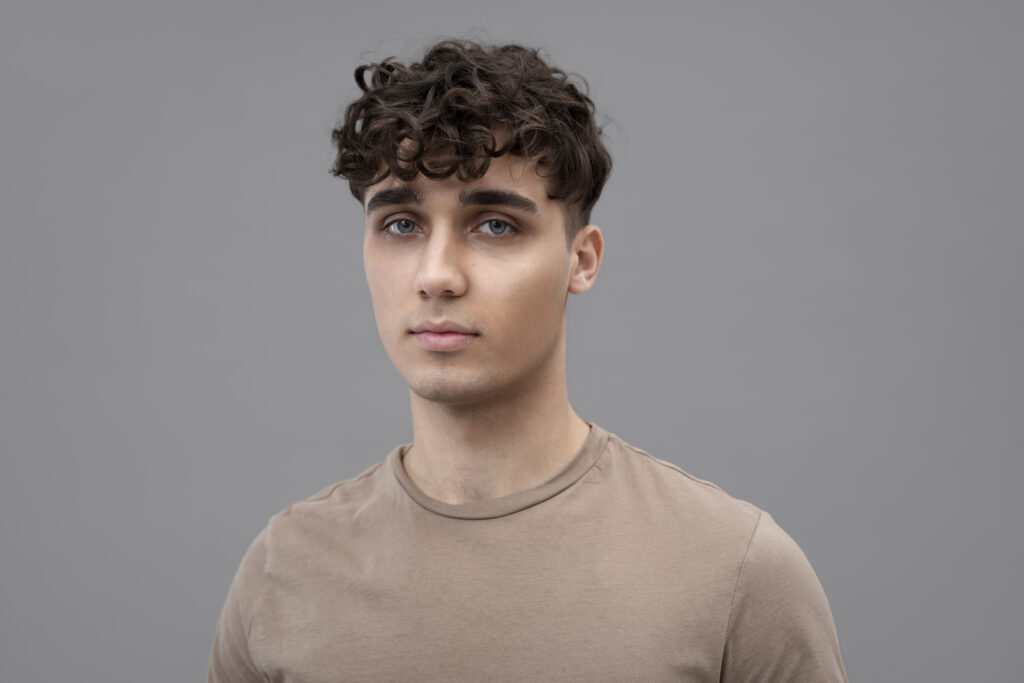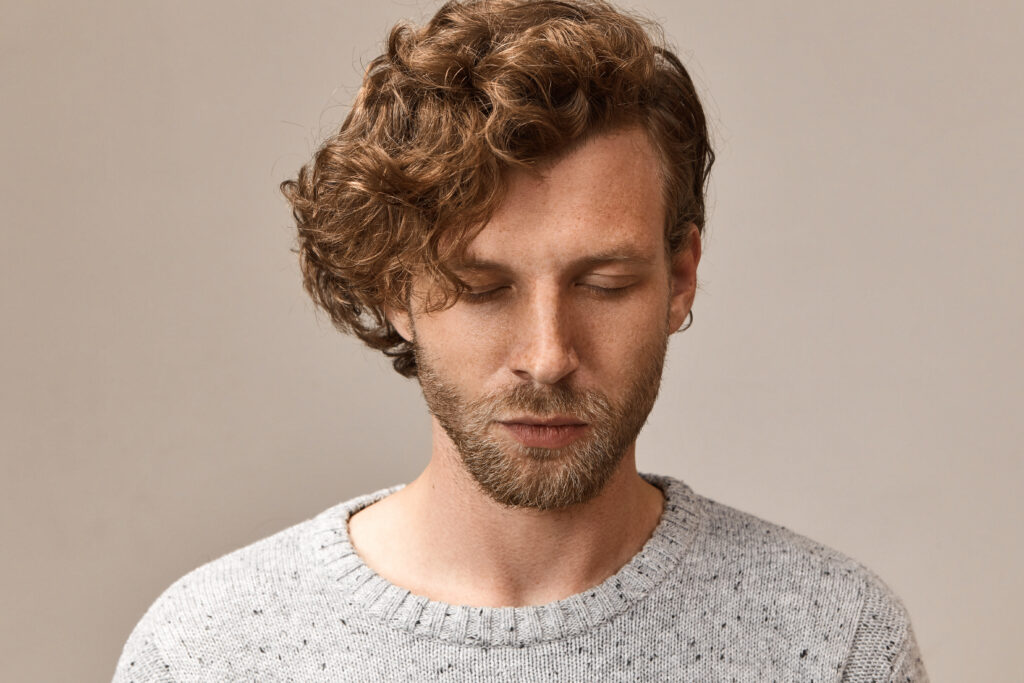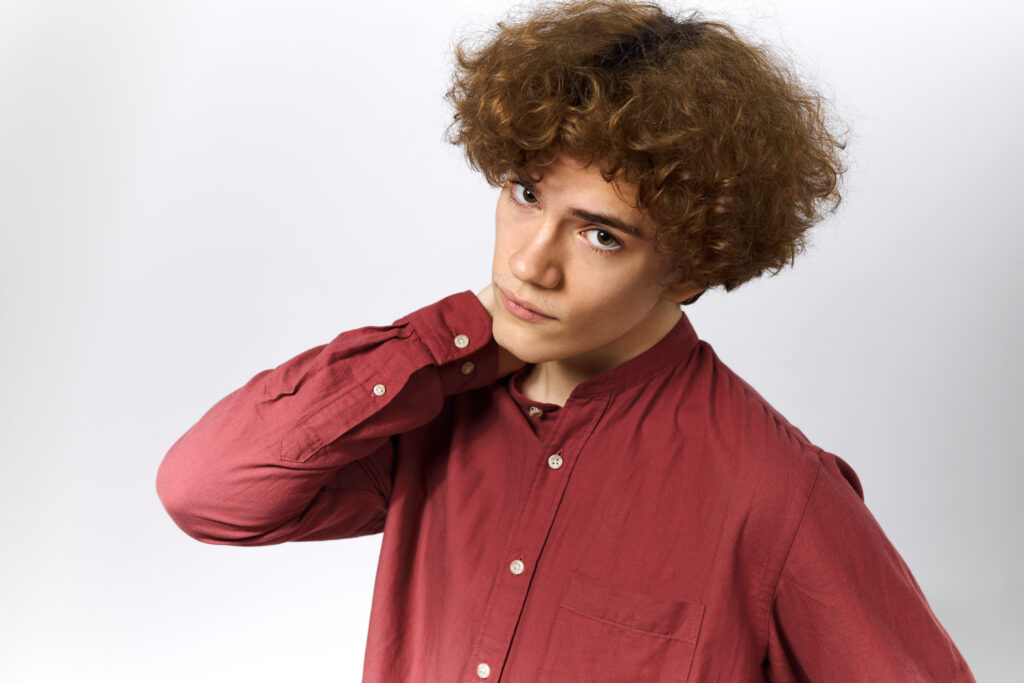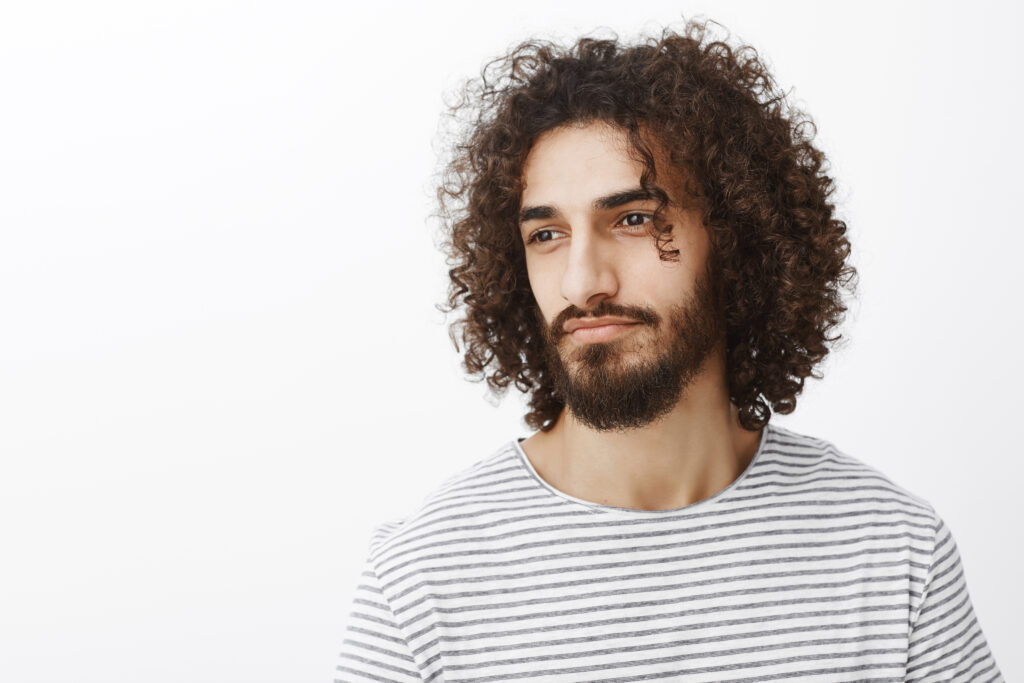Naturally curly hair is no less than a God’s gift for men. This adds to a man’s beauty. Curly hair looks very beautiful but it is very important to take proper care of it. Curly hair tends to dry out more than straight hair. For men, embracing and maintaining healthy curls is not just about aesthetics but also about confidence and self-expression. In this blog post we will tell you about such methods by which you will be able to maintain your curly hair well which will make your curly hair look even more beautiful.

Table of Contents
Toggle1. Understand Your Curl Type
Curl Type Categories: Curly hair ranges from 2A (wavy) to 4C (coily) with unique characteristics.
- Type 2: Wavy hair (2A-2C)
- Type 3: Spiral curls (3A-3C)
- Type 4: Coily hair (4A-4C)
It is important to know the texture, pattern and behavior of your curls as it helps us determine the maintenance needs of our hair.To identify your curl type, observe your hair when it’s wet and dry. By knowing your curl type, you can select the right products and techniques to enhance your natural texture, leading to healthier, more defined curls.
2. Choose the Right Shampoo and Conditioner
Importance of sulfate-free shampoos: Sulfate is a harsh detergent found in commercial shampoos. Sulfate strips away the natural oil of the hair which causes frizz and dryness to the extent that it even damages the hair. That is why we should always use sulfate-free shampoos. Sulfate-free shampoos cleanse our hair thoroughly without stripping it of its natural oils. Sulfate-free shampoos preserve the natural oils of our hair and keep the curls soft, shiny and healthy.
Recommendations for conditioners with moisturizing properties: Conditioner plays a vital role in men’s curly hair care routine. Because curly hair is more dry, it needs proper hydration, so curly hair needs to be conditioned. Whenever you purchase a conditioner, go for a product that contains essential moisturizing ingredients like shea butter, coconut oil, argan oil, and glycerin. These ingredients help to lock in moisture, smooth the hair cuticle, and enhance curl definition. Adding a high-quality, moisturizing conditioner to your routine can significantly improve the health and appearance of your curls.
3. Hydration is Key
Importance of moisturizing the hair: As we discussed above, curly hair is more prone to dryness and frizz than other hair types. Therefore, hydration plays an important role in keeping curls soft and shiny. Hydration maintains curl elasticity and strength, reducing breakage. Incorporating hydration into daily care is essential for healthy, beautiful curls.
To keep your curls hydrated, choose products designed specifically for curly hair. Leave-in conditioners are essential because they provide constant moisture throughout the day without weighing the hair down. Shea butter, glycerin, and aloe vera are common moisturizing ingredients found in these conditioners. Natural oils like coconut oil, argan oil, and jojoba oil are great for locking in moisture and adding another layer of hydration.
These oils can be used on a daily basis or as a deep treatment to nourish and protect your hair. Another excellent product is the curl cream, which not only hydrates but also defines the curls, making them more structured and polished.
When choosing products, avoid those containing harsh chemicals and sulfates, which can strip the hair of its natural oils and cause additional dryness. By carefully selecting and incorporating these hydrating products into your hair care regimen, you can keep your curls soft, shiny, and well-defined.

4. Avoid Over-Washing
Negative effects of excessively washing curly hair: Over-washing curly hair can remove natural oils that are necessary for moisture retention and hair shaft protection. This can cause dryness, frizz, and breakage in your curls, making them difficult to manage and style.
Natural oils produced by the scalp help to keep curly hair hydrated and healthy. When you wash your hair too frequently, these oils are washed out before they can travel down the hair strands. This makes your curls prone to environmental damage and reduces their natural shine.
Furthermore, excessive washing can cause scalp irritation and an imbalance in the scalp’s natural microbiome, potentially resulting in dandruff or itchy scalp.
How often to wash curly hair ?
Unlike straight hair, curly hair doesn’t need to be washed as frequently. Overwashing can strip out the hair’s natural oils, leaving it dry and frizzy. Most experts recommend washing curly hair no more than two to three times a week, depending on your hair’s specific needs and how quickly it gets oily or dirty.
On days you don’t wash your hair, you can refresh your hair with a co-wash (cleansing conditioner) or simply rinse it with water and apply a little conditioner to the ends.
5. Master the Art of Detangling
Gentle detangling is essential for the health and integrity of curly hair. Curly hair is more prone to tangles and knots due to its structure, which can cause breakage and split ends if not handled properly. Aggressive brushing or combing can damage the hair shaft, resulting in frizz and weakening over time.
Gentle detangling reduces breakage, preserves the natural curl pattern, and promotes overall hair health. By taking the time to gently detangle your hair, you can keep your curls defined, bouncy, and healthy, lowering the risk of long-term damage and making your hair easier to manage every day.
6. Embrace Deep Conditioning
Deep conditioning treatments are a game changer for people with curly hair. They work by penetrating the hair shaft to provide intense hydration and essential nutrients, which are essential for keeping curls healthy and vibrant. Also, these treatments can help to repair damage caused by heat styling, chemical treatments, and environmental factors. Regular deep conditioning can improve hair manageability, reduce breakage, and increase overall elasticity, giving curls a softer, shinier, and healthier appearance.
How Often Should You Apply Conditioner on Your Hair ?
Deep conditioning treatments are a game changer for people with curly hair. They work by penetrating the hair shaft to provide intense hydration and essential nutrients, which are essential for keeping curls healthy and vibrant. Also, these treatments can help to repair damage caused by heat styling, chemical treatments, and environmental factors. Regular deep conditioning can improve hair manageability, reduce breakage, and increase overall elasticity, giving curls a softer, shinier, and healthier appearance.

7. Protective Hairstyles and Techniques
Protective hairstyles are essential for curly hair health because they limit exposure to environmental stressors like wind, sun, and pollution. By reducing the need for constant manipulation and styling, these hairstyles help in moisture retention, length retention, and split end prevention.
Protecting curly hair at night is essential for keeping it healthy and preventing damage. Using silk or satin pillowcases reduces friction and helps to retain natural oils in the hair, as opposed to cotton pillowcases, which can cause frizz. Wearing silk or satin bonnets or scarves provides additional protection and minimizes movement, preventing tangling and breakage.
Suggested Hairstyles:
- Curly Undercut
- Curly Fade
- Curly Mohawk
- Curly Fringe
- Curly Afro
- Short Curls
- Curly Tape
- Curly Quiff
- Curly Top with Shaved Sides
- Curly Man Bun
8. Styling Tips for Defined Curls
Gels have a strong hold and prevent frizz, making them ideal for keeping curls in place all day. To prevent your hair from drying out, use alcohol-free gels. Creams are ideal for adding moisture and reducing frizz while maintaining a natural, soft appearance, particularly for thicker, coarser curls. Mousses are lightweight and add volume, enhancing the natural curl pattern while not weighing down fine or medium hair textures. Experimenting with these products, or even combining them, can help you achieve the ideal balance of curl definition and hold.
Creating a step-by-step styling routine specific to your curly hair type ensures consistent excellent results. Begin by washing your hair with a sulfate-free shampoo and moisturizing conditioner to keep your curls hydrated.
To prevent frizz, gently squeeze out excess water with a microfiber towel or cotton T-shirt. To maintain moisture, apply a leave-in conditioner to damp hair, then apply your preferred styling product—whether gel, cream, or mousse—and distribute evenly from roots to tips. If you decide to plop your hair, wrap your curls in a T-shirt and leave it on for 20-30 minutes. After removing the T-shirt, let your hair air dry or use a diffuser on low heat, gently scrunching your curls to enhance their natural shape.
Finish with a lightweight oil or serum to add shine and control flyaways. This routine not only defines your curls but also keeps them healthy and frizz-free, so your hair looks great every day.

9. Regular Trims and Maintenance
Regular trims are essential for maintaining healthy curly hair because they prevent split ends. Split ends make hair appear frizzy and unhealthy. By trimming the ends every few months, you can keep your hair strong, smooth, and manageable.
Curly hair usually benefits from trims every 8-12 weeks. This frequency removes damaged ends while allowing the hair to grow. Regular trims help to maintain the shape of your curls and keep them from looking uneven. If your hair is prone to breakage or damage, you may need to trim it more frequently to maintain its health.
Finding a stylist who specializes in curly hair can significantly improve your hair care routine. A good curly hair specialist will understand the specific needs of curly hair, use proper cutting techniques, and provide personalized advice on how you can maintain your curls.
10. Healthy Lifestyle for Healthy Curls
Maintaining healthy curls requires a well-balanced diet rich in vitamins and minerals. Omega-3 fatty acids, biotin, and vitamins A, C, and E promote hair strength and growth. Drinking plenty of water promotes scalp health and keeps your curls hydrated from the inside out.
Regular physical activity improves blood circulation, which increases nutrient delivery to your hair follicles and promotes healthy growth. Exercise also helps to manage stress, which can cause hair thinning and breakage. Include activities like jogging, swimming, or yoga in your routine to reduce stress and improve overall hair health.
Certain supplements and vitamins can help improve hair health and curl maintenance. Biotin, vitamin D, zinc, and fish oil help to maintain a healthy scalp and prevent hair loss. Always consult with a healthcare provider before beginning any new supplement regimen to ensure that it is appropriate for your needs.
Conclusion
To wrap up, we’ve covered key tips for maintaining healthy curls, including understanding your curl type, selecting the right products, and embracing protective hairstyles. Remember to hydrate your hair, avoid excessive washing, and use proper detangling techniques. Regular trims and a healthy lifestyle are also important for keeping your curls looking great. Following these ten tricks will allow you to maximize the potential of your natural curls.
We would love to hear from you! Share your curly hair care tips and experiences in the comments section below. Your insights and personal stories can help others achieve healthy curls. Let’s create a community where we can support one another and celebrate our natural textures.
FAQs
Curly hair is drier than straight hair, so washing it too frequently can remove its natural oils. Most men with curly hair can get away with washing it once or twice a week. To keep your curls clean without overdrying, use a co-wash (conditioner wash) in between regular washes.
Curl creams, gels, and mousses are specifically designed for curly hair and can help define curls. Products containing shea butter, coconut oil, and glycerin are excellent for adding moisture and definition. Experiment to determine which products are best for your curl type and texture.
Frizz is a common problem for curly hair, particularly in humid climates. To reduce frizz, apply a leave-in conditioner or anti-frizz serum and avoid touching your hair while it is drying. To gently remove excess water without frizz, try the “plopping” method with a microfiber towel or cotton t-shirt.
Dry and brittle curls frequently require extra hydration. Include a deep conditioning treatment once a week in your routine to replenish moisture. Use a moisturizing shampoo and conditioner, and consider incorporating a leave-in conditioner or hair oil into your routine. Avoid using heat styling or harsh chemicals on your hair, as these can cause further damage.
Regular trims are essential for keeping your curls healthy and preventing split ends. Trim your curly hair every 6-8 weeks. However, if you’re growing out your hair, you could extend this to 8-12 weeks. Regular trims help to keep your curls in shape and healthy.